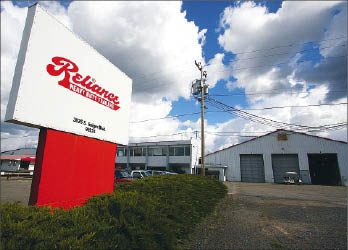
Home » Liquidation ends trailer maker's run
Liquidation ends trailer maker's run
Reliance Trailer, Alloy's successor, shut down quietly a few months ago

April 8, 2010
The last remnants of a truck trailer manufacturing operation here that dates back nearly half a century and had employed more than 300 people for a time were scheduled to be auctioned off today.
Reliance Trailer Co. LLC, at 3025 S. Geiger Blvd., quietly shut down several months ago, 12 years after its founders, California businessmen Brian Ling and Duke Yolo, had bought the assets of Alloy Trailers Inc., of Spokane, out of bankruptcy. Alloy had opened here in 1961.
Cozad Trailer Sales LLC, of Stockton, Calif., reportedly bought Reliance's assets, then hired Garry Montague Auctioneers, of Spokane, to liquidate what remains of them.
Tom Pistacchio, co-owner of Cozad and the company's top executive, couldn't be reached for comment. A flyer on the auction company's Web site said, though, that the sale scheduled for today at Reliance's West Plains facility would be a "complete liquidation."
It said items to be auctioned off included all manufacturing equipment and tooling, a parts inventory, new aluminum and steel inventory, electric tools, a number of forklifts, more than 50 welders, overhead cranes, and office furnishings. Because of the large amount of equipment and materials to be sold, the auction company said it might need to run two auction rings.
Reliance had occupied a total of about 105,000 square feet of office and manufacturing space in a number of buildings on the 23-acre site just south across Geiger Boulevard from Spokane's waste-to-energy plant. It isn't clear yet what will happen with the buildings and land there, which the company reportedly leased and are owned separately.
Last year, commercial truck-trailer sales nationwide dipped to their lowest level since 1975, says Columbus, Ind.-based ACT Research Co., which claims to be the premier source of market analysis for commercial trucks and trailers.
Such shipments were down 44 percent last year from 2008, ACT Research says, but it says February trailer orders were up 168 percent from February 2009 and at their highest level in two years, suggesting that the sales-flattening effects of the recession are beginning to lift.
As recently as four years ago, Reliance appeared to be on a growth track. It employed about 230 workers here then, having more than tripled its work force since 2003, when its owners consolidated here affiliated manufacturing operations from Lynnwood, Wash., and Cotati, Calif., and was manufacturing trailers and dump-truck boxes.
"A lot of companies haven't bought equipment over the last few years, and that's generated a built-up demand for trailers that are being purchased now," Steve Retherford, then general manager, told the Journal in May 2006.
Founders Ling and Yolo also owned Reliance Trailer Manufacturing Inc., a Cotati trailer maker, and in 2001, their Spokane company bought the assets of Sturdy Weld Equipment & Design Inc., a Lynnwood trailer maker. In 2003, they moved the California and Lynnwood manufacturing operations to the Geiger facility, which before that consolidation employed about 70 workers.
Reliance's primary focus at that time was on products aimed at the aggregate industry, such as companies that hauled dirt, gravel, and asphalt, whereas Alloy produced a broader range of flatbed and van trailers, as well as some specialty products.
Reliance said it began turning a profit about a year after acquiring Alloy's assets by cutting Alloy's former production level, closing a 160,000-square-foot manufacturing facility that Alloy had been operating in the Spokane Business & Industrial Park, in Spokane Valley, and no longer competing with national, high-volume trailer makers.
When Alloy opened 49 years ago, it was one of three over-the-road trailer manufacturers in Spokane and one of about 300 such companies in the U.S., but by the mid-1990s, only about 26 full-line manufacturers remained, and Alloy was the largest in the western U.S., company executives said.
It employed 300 people in 1988, then was forced to trim its work force by about half due to a national economic slump, but had rebounded strongly by 1992 and continued to expand through the mid-1990s, before running into the financial problems that forced it into bankruptcy.
Latest News
Related Articles



![Brad head shot[1] web](https://www.spokanejournal.com/ext/resources/2025/03/10/thumb/Brad-Head-Shot[1]_web.jpg?1741642753)
